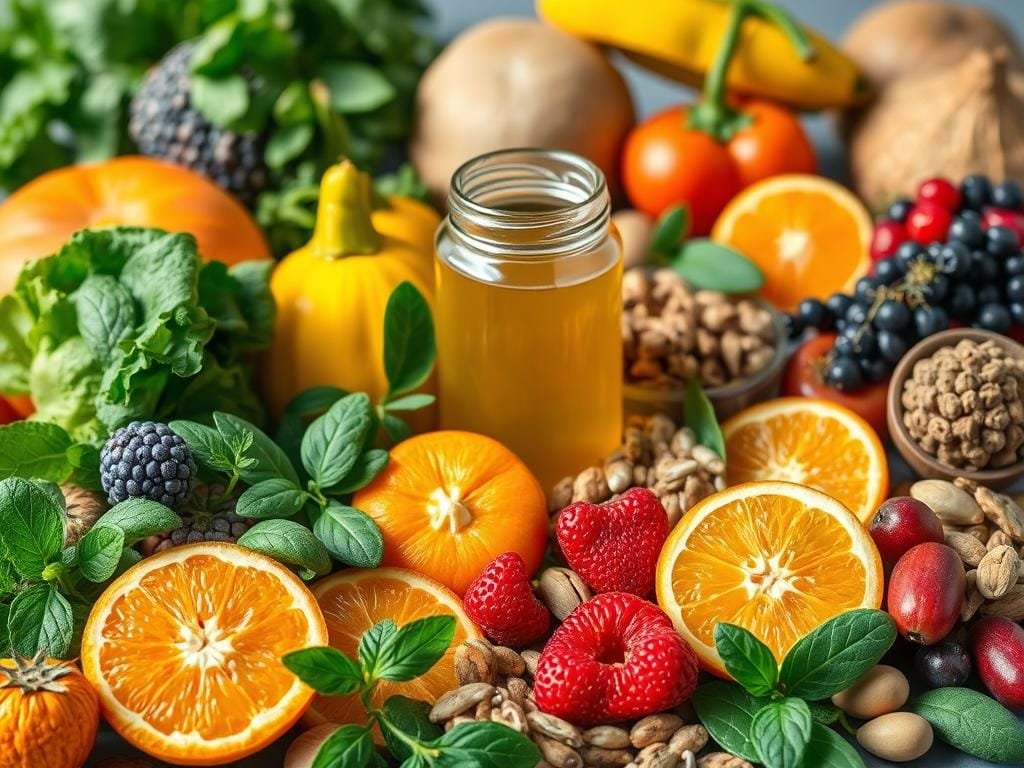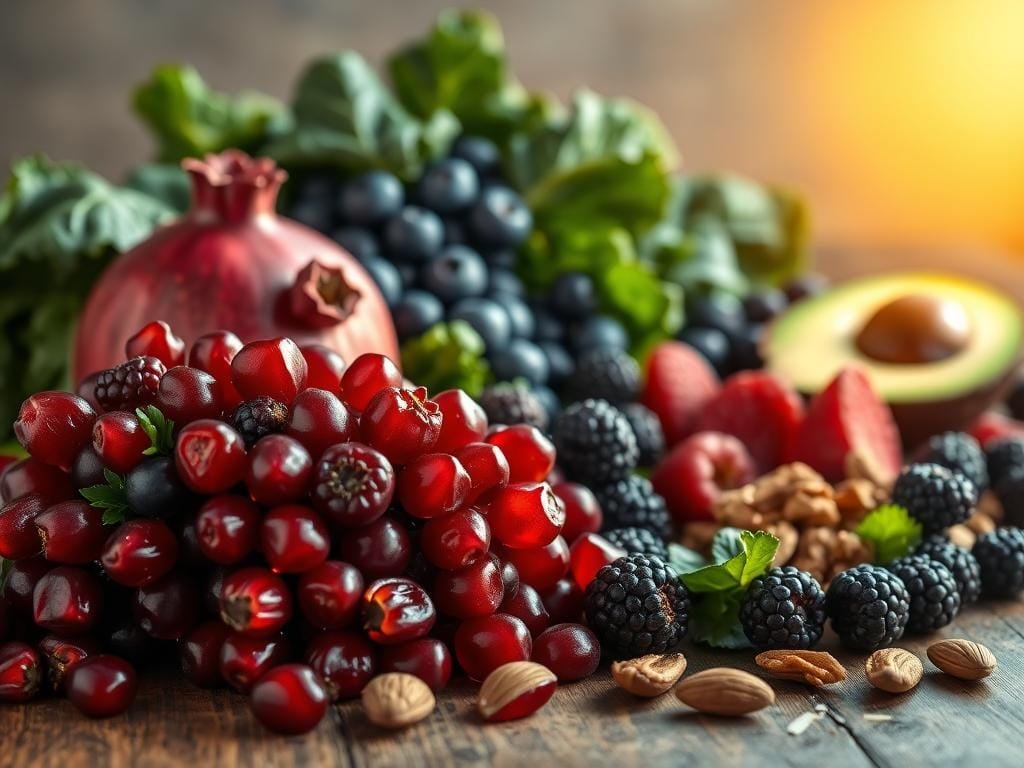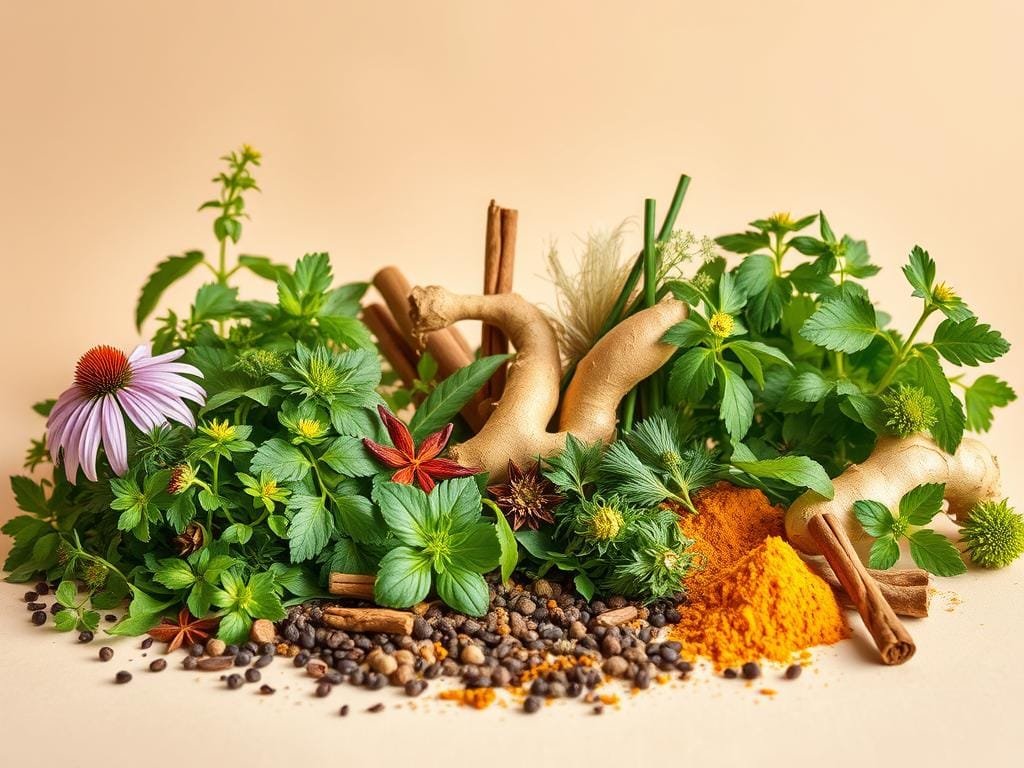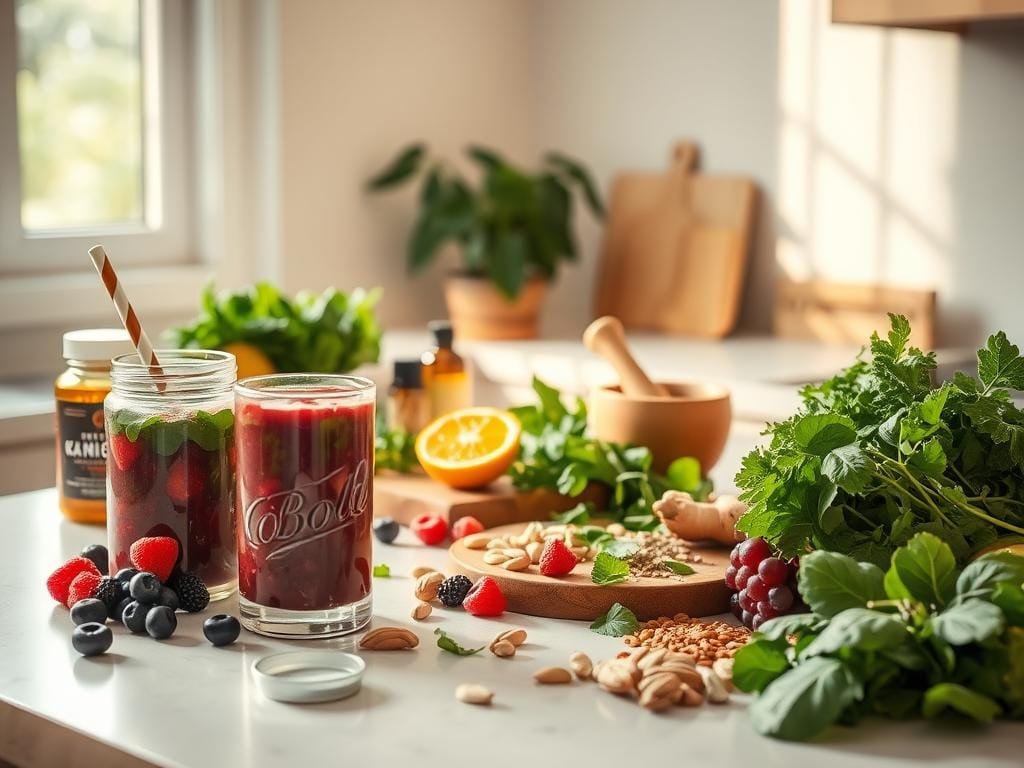Your body’s first defense against sickness is a strong immune system. With so many health threats, people are looking for natural ways to boost their immunity. Did you know some foods can really help your immune function? Adding superfoods for immunity to your meals is a simple way to keep healthy.
Eating foods rich in nutrients, like citrus fruits and leafy greens, gives your body what it needs. For more on how these foods help, check out Medical News Today. Also, learn about immune-boosting supplements on Boost Healthy Life.
Table of Contents
Key Takeaways
- Eating a variety of nutrient-rich foods can help boost your immune system.
- Certain superfoods for immunity like citrus fruits and ginger have been shown to have immune-boosting properties.
- Incorporating these foods into your diet can be a simple way to support your overall health.
- A stronger defense against infections and diseases starts with a robust immune system.
- Maintaining a balanced diet is key for natural immunity.
The Science of Immune Health and Nutritional Support
Your immune system is like a shield that protects you from sickness. It’s made up of cells, tissues, and organs working together. Knowing how it works and how food helps it is key to staying healthy.
How Your Immune System Protects Your Body
Your immune system finds and fights off bad guys. It has white blood cells, lymph nodes, and organs like the spleen and thymus. These parts work together to keep you safe from harm.
A strong immune system is essential for your health. It keeps infections away, heals wounds, and fights diseases.
The Critical Connection Between Diet and Immunity
What you eat affects your immune system. Eating a variety of whole foods gives your body the nutrients it needs. Foods rich in antioxidants, fiber, and essential nutrients boost your immune strength.
For more info on foods that boost immunity, visit Boost Healthy Life.
Why Nutrient Density Matters for Immune Function
Nutrient-dense foods are packed with vitamins, minerals, and other good stuff. They’re low in calories but high in value. These foods are vital for your immune system because they help repair tissues and make immune cells.
Key nutrients for immune health include:
- Vitamin C: Important for making white blood cells.
- Vitamin D: Helps regulate immune cell function.
- Zinc: Crucial for activating immune cells.
- Phytonutrients: In fruits and veggies, they have antioxidant properties.
Eating nutrient-dense foods and a balanced diet helps your immune system work its best.
Identifying Immune-Boosting Nutrients and Their Sources
Boosting your immunity starts with the right nutrients. A balanced diet with vitamins, minerals, and phytonutrients is key. You’ll learn how to add these to your meals.
Essential Vitamins for Immune Support
Vitamins are vital for a healthy immune system. Vitamin C boosts white blood cells. Find it in oranges, grapefruits, strawberries, and bell peppers.
Vitamin D also supports immunity. Lack of it makes you more prone to infections. Get it from fortified dairy, fatty fish, and sunlight.
B vitamins like B6, B9, and B12 are also important. They’re in lean meats, fish, eggs, legumes, and leafy greens. Eating enough of these or taking supplements helps your immune system.

Critical Minerals That Strengthen Immunity
Minerals are also key for immunity. Zinc activates immune cells. Find it in oysters, beef, chicken, and fortified cereals.
Selenium acts as an antioxidant. Brazil nuts, fish, and turkey are good sources.
For more on vitamins and minerals, check this resource. It offers detailed health support.
Phytonutrients and Antioxidants That Fight Inflammation
Plant-based foods have powerful nutrients. Flavonoids, carotenoids, and polyphenols boost immunity. Berries, green tea, and dark chocolate are full of them.
Eating a variety of colorful fruits and vegetables gives you many nutrients.
“A diet rich in fruits, vegetables, and whole grains can provide the necessary nutrients to support immune function and overall health.”
By adding these nutrients to your diet, you can strengthen your immune system. This helps keep you healthy and well.
Superfoods for Immunity: Your Complete Guide
Eating the right foods is key to a strong immune system. Certain superfoods can help keep your body healthy. Adding these foods to your diet can boost your body’s defense against sickness.
Colorful Fruits and Vegetables for Antioxidant Power
Colorful fruits and veggies are not just pretty. They’re full of antioxidants that protect your cells. Foods like berries, citrus fruits, and leafy greens are packed with vitamins C and E. These nutrients help your immune system work better.
Eating antioxidant-rich foods can also reduce inflammation. This promotes overall health.
- Berries such as blueberries and strawberries are high in vitamin C
- Citrus fruits like oranges and grapefruits provide a good source of vitamin C
- Leafy greens including spinach and kale are rich in antioxidants

Protein-Rich Immune Boosters
Protein is vital for a strong immune system. It helps build and repair body tissues. Protein-rich foods like lean meats, fish, eggs, and legumes are essential. Nuts and seeds, such as almonds and sunflower seeds, are also great protein sources.
- Include lean meats like chicken and turkey in your meals
- Eat fish rich in omega-3 fatty acids, such as salmon
- Add legumes like lentils and chickpeas to your soups and salads
Fermented Foods for Gut-Immune Health
Fermented foods are full of probiotics, which are good for your gut and immune system. Foods like yogurt, kefir, sauerkraut, and kimchi have live cultures. These help keep your gut healthy. For more on functional foods, including fermented ones, check this resource.
- Start your day with a bowl of yogurt topped with berries
- Add sauerkraut to your salads for a probiotic boost
- Enjoy kimchi as a side dish with your meals
Medicinal Mushrooms and Their Immune Benefits
Medicinal mushrooms have been used for centuries to boost immunity. Types like reishi, shiitake, and chaga are known for their immune benefits. You can find them in teas, supplements, or add them to meals.
“Mushrooms have been used in traditional medicine for their health benefits, including immune system support.”
By adding these superfoods to your diet, you can support your immune system. There are many options, from colorful fruits and veggies to medicinal mushrooms. You can find something that fits your taste and dietary needs.
Powerful Herbs and Spices for Enhanced Immunity
Herbs and spices can boost your immune system. For ages, people have used them for taste and health benefits. Adding the right ones to your meals can make your immune system stronger.

Anti-inflammatory Spices: Turmeric, Ginger, and Cinnamon
Some spices are great at fighting inflammation, which helps your immune system. Turmeric has curcumin, a strong anti-inflammatory. Turmeric cuts down inflammation and boosts antioxidants. Ginger is full of antioxidants, boosting your immune system. Cinnamon adds flavor and fights inflammation, helping fight off infections.
- Turmeric: Contains curcumin, which reduces inflammation.
- Ginger: High in antioxidants, supports immune function.
- Cinnamon: Anti-inflammatory properties, fights infections.
Immune-Boosting Herbs: Echinacea, Elderberry, and Astragalus
Herbs like Echinacea, Elderberry, and Astragalus boost your immune system. Echinacea helps by making more white blood cells. Elderberry is full of antioxidants and vitamins that fight infections. Astragalus is used in Chinese medicine to boost immunity and has antiviral effects.
“The use of herbs like Echinacea and Elderberry can be a valuable addition to your immune-boosting regimen.” – Health Expert
Everyday Alliums: Garlic, Onions, and Their Immune Properties
Garlic and Onions are in the Allium family and boost your immune system. Garlic has compounds that fight off microbes and viruses, boosting your immune system. Onions are full of antioxidants, reducing inflammation and improving your immune response.
For more info on natural supplements, check out Boost Healthy Life.
How to Store and Use Herbs for Maximum Potency
Keep herbs and spices fresh by storing them right. Place them in a cool, dry spot away from sunlight. Use airtight containers to keep their flavor and health benefits. Add them to your dishes at the end of cooking to keep their potency.
- Store herbs and spices in a cool, dry place.
- Use airtight containers.
- Add herbs and spices towards the end of cooking.
Building Your Daily Immune-Support Routine
To keep your immune system strong, it’s key to have a daily routine. Simple changes in your habits can boost your body’s fight against infections. This includes what you eat, how you live, and managing stress.
Morning Rituals for Immune Strength
Starting your day with immune-boosting habits is a great way to stay healthy. Begin with warm water and lemon to kickstart your digestion and metabolism. A morning smoothie with berries, spinach, and almond milk is also a great choice.
Nutritional Tips for Morning: Eat foods high in vitamin C, like citrus fruits or berries, to strengthen your immune system.

Midday Immune Support Strategies
Keeping your immune system strong all day is important. A good snack at midday with nuts, seeds, or fruits can help. Drinking plenty of water is also key. Herbal teas or green tea, full of antioxidants, are great choices.
| Food | Immune Benefit |
|---|---|
| Nuts and Seeds | Rich in Vitamin E, supporting immune function |
| Fruits | High in Vitamin C, boosting immune response |
| Green Tea | Rich in Antioxidants, fighting off free radicals |
Evening Practices for Overnight Immune Recovery
At night, focus on habits that help your immune system recover. Eat dinner with foods like garlic, onions, and mushrooms. Relaxation techniques, such as meditation or deep breathing, are also important.
Relaxation Techniques: Yoga or reading before bed can calm your mind and body, aiding in immune recovery.
Practical Recipes and Preparation Methods
Adding immune-boosting superfoods to your meals is easy and tasty. Use the right ingredients and cooking methods. This way, you can make dishes that are not only delicious but also good for your immune system.
Immune-Boosting Smoothies and Juices
Start your day with a smoothie or juice full of nutrients. Blend spinach, banana, and pineapple for a refreshing drink. Adding chia seeds gives you extra omega-3 fatty acids.
- Blend frozen berries, Greek yogurt, and spinach for a smoothie full of antioxidants.
- Make a green juice with kale, apple, and lemon for a refreshing immune booster.
Superfood Soups and Broths
Soups and broths are great for adding immune-boosting ingredients to your diet. Try a chicken soup with carrots, celery, and garlic. For a vegan option, make a lentil soup with spices and herbs.
- Prepare a hearty minestrone soup with beans, vegetables, and tomatoes.
- Simmer bones with vegetables and herbs to make a nourishing bone broth.
Simple Superfood Meals for Busy Weekdays
Even on busy days, you can make simple, nutritious meals. Try a quinoa salad with roasted vegetables and citrus vinaigrette. Or, grill salmon with steamed broccoli for a quick dinner.
- Grill chicken breast with roasted sweet potatoes and green beans.
- Stir-fry vegetables, tofu, and brown rice for a hearty meal.
Preserving Nutrients: Cooking Methods That Matter
How you cook your food affects its nutritional value. Choose steaming or stir-frying to keep nutrients in your superfoods. Avoid overcooking or boiling, as these methods can reduce nutrients.
For more healthy recipes and nutrition facts, visit Boost Healthy Life for inspiration and guidance.
Seasonal Immunity: Adapting Your Superfood Strategy
To keep your immune system strong, adjust your superfood intake with the seasons. Each season poses unique challenges to your immune system. The right superfoods can help you stay ahead.
Winter Immune Defense Protocol
In winter, your body needs extra support against colds and flu. Add warming superfoods like ginger, turmeric, and dark leafy greens to your diet. Soups and stews with garlic and onions are comforting and boost immunity.
For more ideas, visit Manipal Hospitals’ blog on superfoods. It offers a variety of options.
Spring Cleansing for Immune Reset
Spring is ideal for resetting your immune system. Eat detoxifying foods like citrus fruits, leafy greens, and cruciferous vegetables. These foods cleanse your body and prepare it for warmer months.
Summer Immune Maintenance
Summer is perfect for enjoying fruits and vegetables rich in vitamins and minerals. Add antioxidant-rich foods like berries, tomatoes, and bell peppers to your diet. Drinking plenty of water is also key.
Fall Preparation for Cold and Flu Season
As fall comes, prepare your immune system for the cold months. Eat immune-boosting foods like mushrooms, elderberries, and fermented foods. These foods strengthen your immune system and lower illness risk.
Adapting your superfood strategy to the seasons keeps your immune system strong all year.
Overcoming Common Challenges to Superfood Integration
Adding superfoods to your diet can be tough, but there are ways to get past these obstacles.
Addressing Taste Preferences and Picky Eating
Superfoods can taste strong or different. Start by adding a little to your meals. Try a spoonful of chia seeds in your oatmeal or blend spinach into your smoothie. Slowly increase the amount to get used to it.
Also, mix superfoods with foods you like. If kale tastes bad to you, add it to a flavorful stew or curry. Try different cooking ways like roasting or sautéing to make superfoods taste better.
Budget-Friendly Approaches to Immune-Boosting Foods
Superfoods can be pricey, but there are ways to save money. Buy big packs of oats, lentils, and frozen berries to cut costs. Shopping at local markets or joining a CSA program can also help you get fresh produce at good prices.
Look for cheaper alternatives to superfoods. Instead of goji berries, try dried cranberries or raisins for less money. Being flexible and planning meals around seasonal produce can make superfoods more affordable.
Time-Saving Preparation and Storage Solutions
Busy lives can make it hard to cook superfood meals. Spend a few hours on the weekend to prep. Chop veggies, cook grains, and portion out superfoods for easy use all week. A slow cooker can also save time, letting you cook while you’re busy.
Keep a well-stocked pantry with canned beans, frozen veggies, and whole grains. These can quickly turn into healthy meals. Batch cooking and freezing meals can also save time during the week.
Navigating Food Sensitivities and Allergies
Be careful when trying new superfoods, as they can cause sensitivities or allergies. Start with small amounts to see how you react. Watch for any bad reactions, like with almonds or shellfish. Keeping a food diary can help you track any issues.
If you have an allergy or sensitivity, find other superfoods that are safe. For example, if you’re allergic to tree nuts, try sunflower seeds or pumpkin seeds. Always check labels and choose products that avoid cross-contamination with allergens.
Conclusion: Your Roadmap to Sustained Immune Strength
You now know how vital it is to add immune-boosting foods to your meals. Also, having a daily routine that boosts your immune system is key. To keep your immune system strong, eat a balanced diet full of fresh foods. Also, adjust your diet with the seasons.
The five life forces for health and immunity are important. They are nutrition, hydration, oxygenation, alkalization, and detoxification. These forces work together to keep you healthy.
Sticking to a routine that includes healthy foods, enough water, and exercise is important. As you work towards better immune health, remember to change your plan with the seasons. This will help keep your immune system strong all year.
By following this roadmap, you can keep your immune system strong and stay healthy. Living a balanced life helps you fight off illnesses and enjoy your daily activities.

